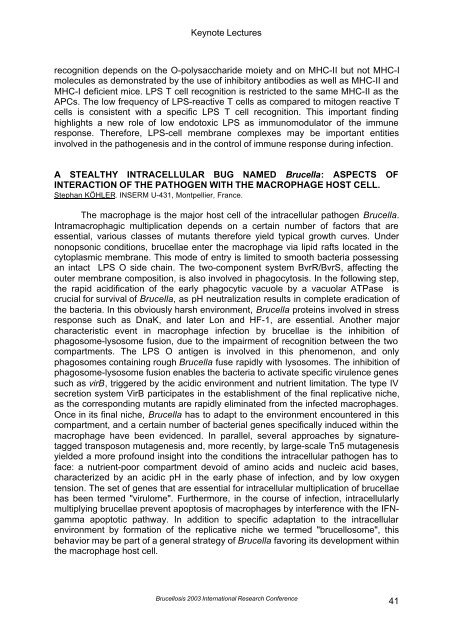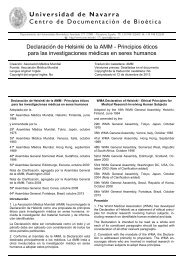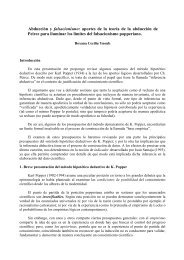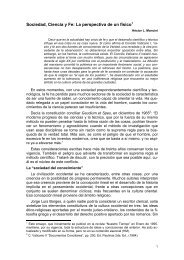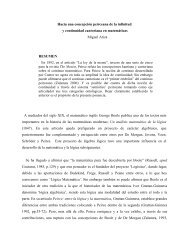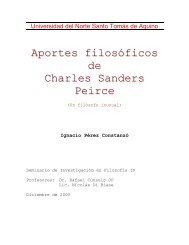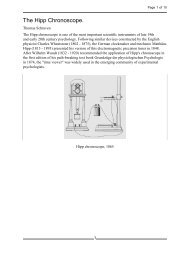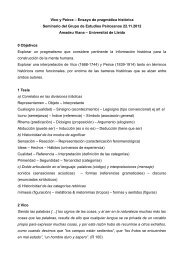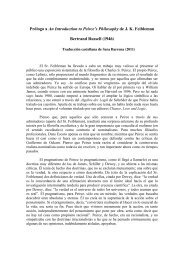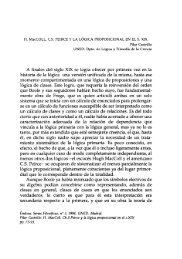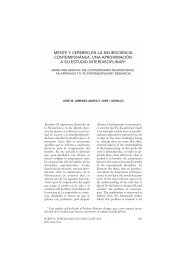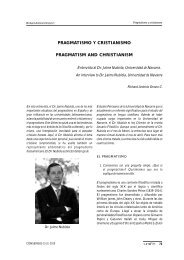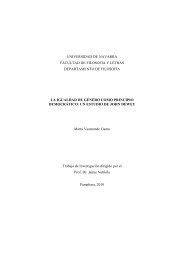Brucellosis 2003 proceedings - PHIDIAS
Brucellosis 2003 proceedings - PHIDIAS
Brucellosis 2003 proceedings - PHIDIAS
You also want an ePaper? Increase the reach of your titles
YUMPU automatically turns print PDFs into web optimized ePapers that Google loves.
Keynote Lectures<br />
recognition depends on the O-polysaccharide moiety and on MHC-II but not MHC-I<br />
molecules as demonstrated by the use of inhibitory antibodies as well as MHC-II and<br />
MHC-I deficient mice. LPS T cell recognition is restricted to the same MHC-II as the<br />
APCs. The low frequency of LPS-reactive T cells as compared to mitogen reactive T<br />
cells is consistent with a specific LPS T cell recognition. This important finding<br />
highlights a new role of low endotoxic LPS as immunomodulator of the immune<br />
response. Therefore, LPS-cell membrane complexes may be important entities<br />
involved in the pathogenesis and in the control of immune response during infection.<br />
A STEALTHY INTRACELLULAR BUG NAMED Brucella: ASPECTS OF<br />
INTERACTION OF THE PATHOGEN WITH THE MACROPHAGE HOST CELL.<br />
Stephan KÖHLER. INSERM U-431, Montpellier, France.<br />
The macrophage is the major host cell of the intracellular pathogen Brucella.<br />
Intramacrophagic multiplication depends on a certain number of factors that are<br />
essential, various classes of mutants therefore yield typical growth curves. Under<br />
nonopsonic conditions, brucellae enter the macrophage via lipid rafts located in the<br />
cytoplasmic membrane. This mode of entry is limited to smooth bacteria possessing<br />
an intact LPS O side chain. The two-component system BvrR/BvrS, affecting the<br />
outer membrane composition, is also involved in phagocytosis. In the following step,<br />
the rapid acidification of the early phagocytic vacuole by a vacuolar ATPase is<br />
crucial for survival of Brucella, as pH neutralization results in complete eradication of<br />
the bacteria. In this obviously harsh environment, Brucella proteins involved in stress<br />
response such as DnaK, and later Lon and HF-1, are essential. Another major<br />
characteristic event in macrophage infection by brucellae is the inhibition of<br />
phagosome-lysosome fusion, due to the impairment of recognition between the two<br />
compartments. The LPS O antigen is involved in this phenomenon, and only<br />
phagosomes containing rough Brucella fuse rapidly with lysosomes. The inhibition of<br />
phagosome-lysosome fusion enables the bacteria to activate specific virulence genes<br />
such as virB, triggered by the acidic environment and nutrient limitation. The type IV<br />
secretion system VirB participates in the establishment of the final replicative niche,<br />
as the corresponding mutants are rapidly eliminated from the infected macrophages.<br />
Once in its final niche, Brucella has to adapt to the environment encountered in this<br />
compartment, and a certain number of bacterial genes specifically induced within the<br />
macrophage have been evidenced. In parallel, several approaches by signaturetagged<br />
transposon mutagenesis and, more recently, by large-scale Tn5 mutagenesis<br />
yielded a more profound insight into the conditions the intracellular pathogen has to<br />
face: a nutrient-poor compartment devoid of amino acids and nucleic acid bases,<br />
characterized by an acidic pH in the early phase of infection, and by low oxygen<br />
tension. The set of genes that are essential for intracellular multiplication of brucellae<br />
has been termed "virulome". Furthermore, in the course of infection, intracellularly<br />
multiplying brucellae prevent apoptosis of macrophages by interference with the IFNgamma<br />
apoptotic pathway. In addition to specific adaptation to the intracellular<br />
environment by formation of the replicative niche we termed "brucellosome", this<br />
behavior may be part of a general strategy of Brucella favoring its development within<br />
the macrophage host cell.<br />
<strong>Brucellosis</strong> <strong>2003</strong> International Research Conference<br />
41


